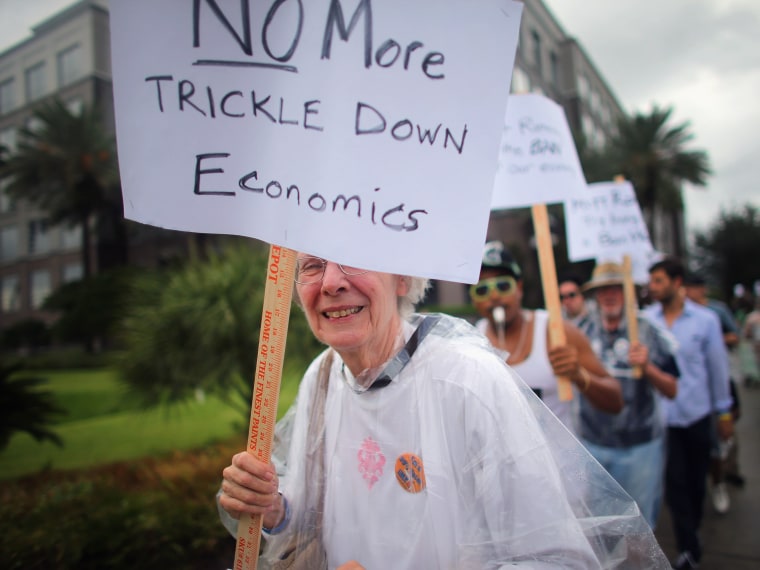Obama brought the minimum wage increase back into the national spotlight during his State of the Union address on Tuesday, announcing:
“Today, a full-time worker making the minimum wage earns $14,500 a year. Even with the tax relief we’ve put in place, a family with two kids that earns the minimum wage still lives below the poverty line. That’s wrong. That’s why, since the last time this Congress raised the minimum wage, nineteen states have chosen to bump theirs even higher. Tonight, let’s declare that in the wealthiest nation on Earth, no one who works full-time should have to live in poverty, and raise the federal minimum wage to $9.00 an hour.”
“I don’t want to say there are no problems with the minimum wage, but it is better than nothing,” the Washington Post’s Ezra Klein told msnbc’s Alex Wagner. “And at the moment, Republicans have basically said it is this or it is nothing.”
With GOP opposition to other employee compensation legislation, Klein said the president was forced to make the federal minimum wage an issue again. He noted that Obama’s first choice would have been extending the Making Work Pay tax credit, which was a component of 2009’s stimulus measure and acted as a form of the minimum wage through the tax code. Republicans would not extend that, and the credit eventually lapsed in 2010. Runner-up for the Obama administration, Klein notes, would have been the Payroll Tax Cut--a tax holiday for the middle class which was conspired in the early sequestration deal but later abandoned in the latest fiscal cliff negotiations, leaving it to expire in January.
Leaders and stand-outs among the Republican party followed up President Obama's State of the Union in vocal protest to increasing pay on the federal level.
“I don't think a minimum wage law works,” Sen. Marco Rubio told CBS. “I want people to make a lot more than $9. Nine dollars is not enough. You can't do that by mandating it in the minimum wage laws. Minimum wage laws have never worked in terms of helping the middle class obtain prosperity.”
“A lot of people who are being paid the minimum wage are being paid that because they come to the workforce with no skills, and this makes it harder for them to acquire the skills they need in order to climb that ladder successfully,” said House Speaker John Boehner.
Overall since 1970, corporate profits have increased while employee compensation has declined.
“Corporate profits have gone way, way, way up. Over the last 40-50 years, worker power as manifested in large part through labor unions and other mechanisms has gone down," Klein said, outlining the argument for a minimum wage hike. "Now what you are seeing is that corporations are profitable, but they are not feeling the need to share as much of those profits with their workers.”
An extensive November study by Demos looked at the effect of raising the minimum wage. They estimated that raising it could lift more than 700,000 Americans out of poverty. Demos also reported that 63% of low-wage retail workers are women, and low-wage workers are also slightly disproportionately African Americans and Hispanics.
“I think the economics of the minimum wage are really complicated," Klein continued. "On the one hand, you’ve got a lot of studies that look at what happens to employment, and there a bunch of studies that say there is no effect. And then there are a bunch of studies actually that find there is a very small negative effect. You can sort of pick which ones you believe. I think both have good points behind them. But maybe the small, negative effect is worth it at times.”
The federal minimum wage was last increased on July 24, 2009, when it was raised to $7.25 an hour.
